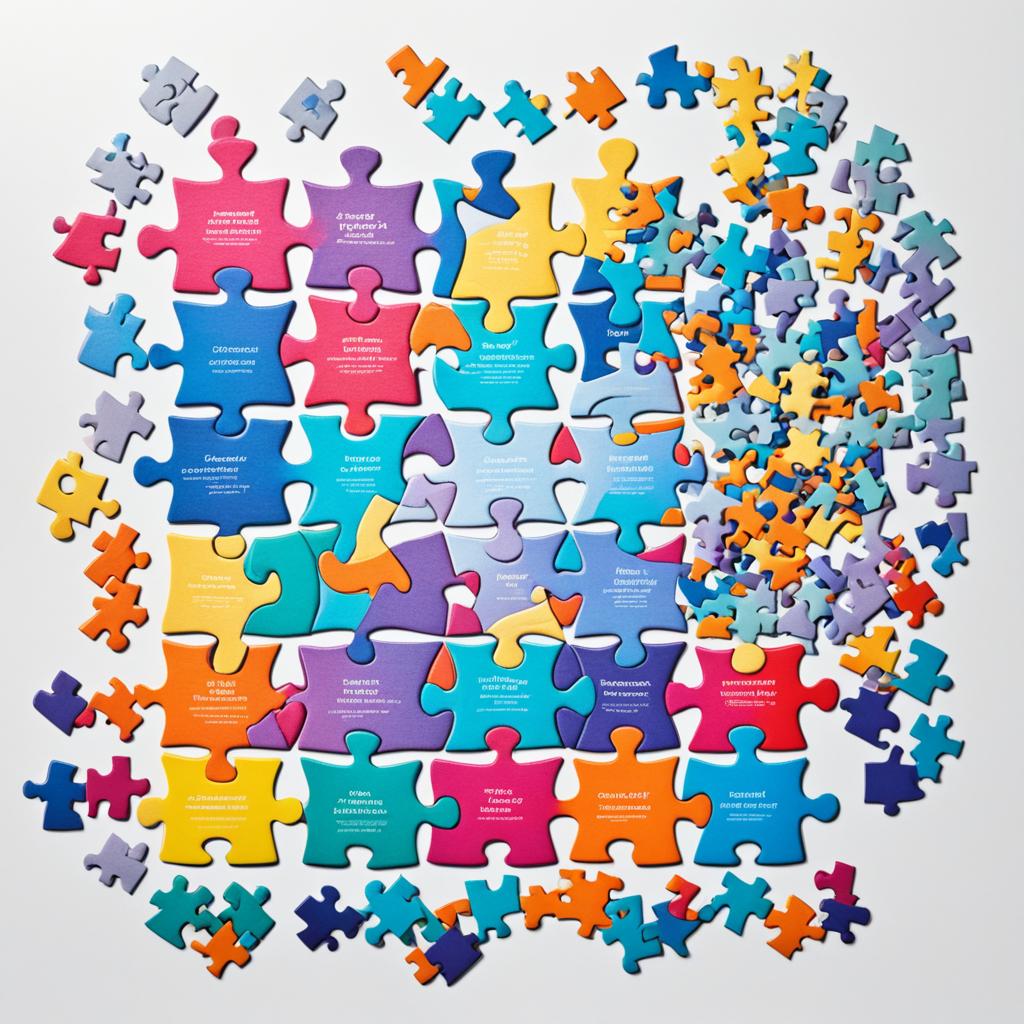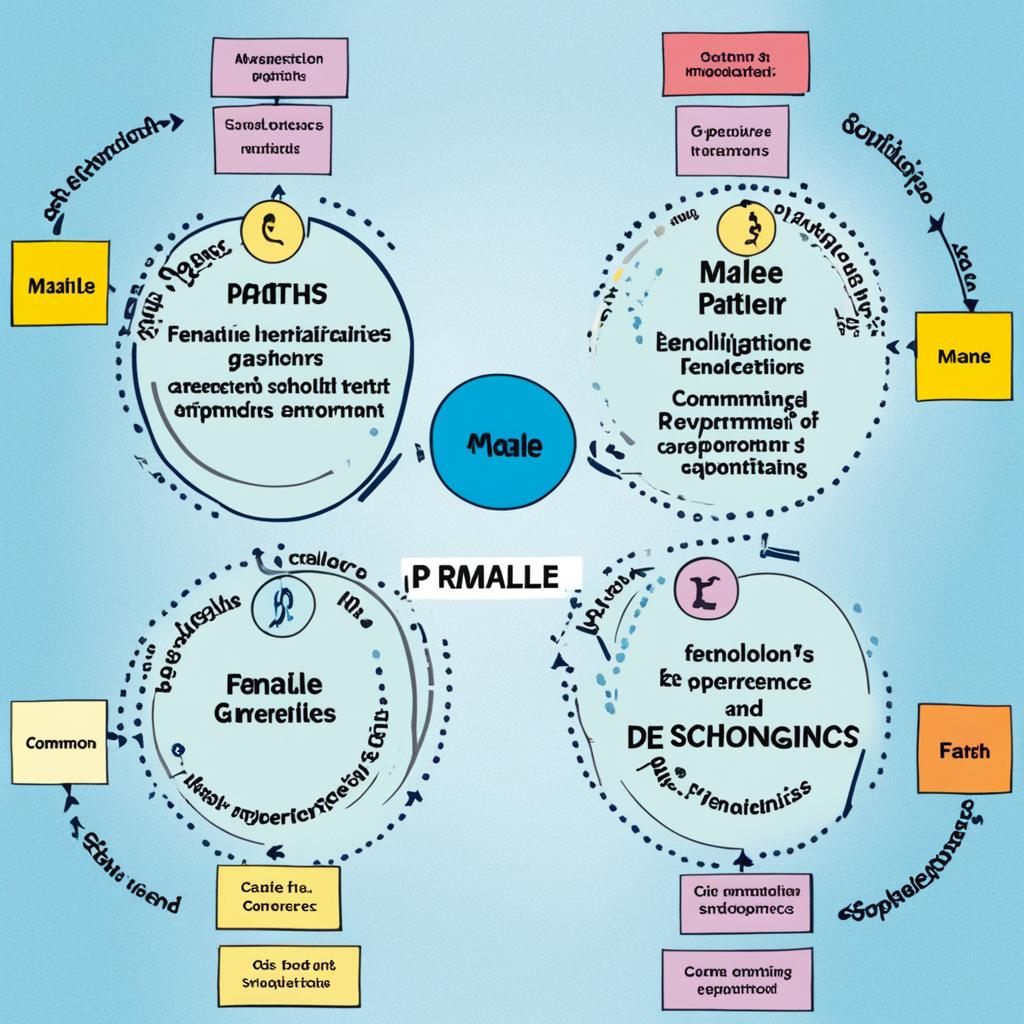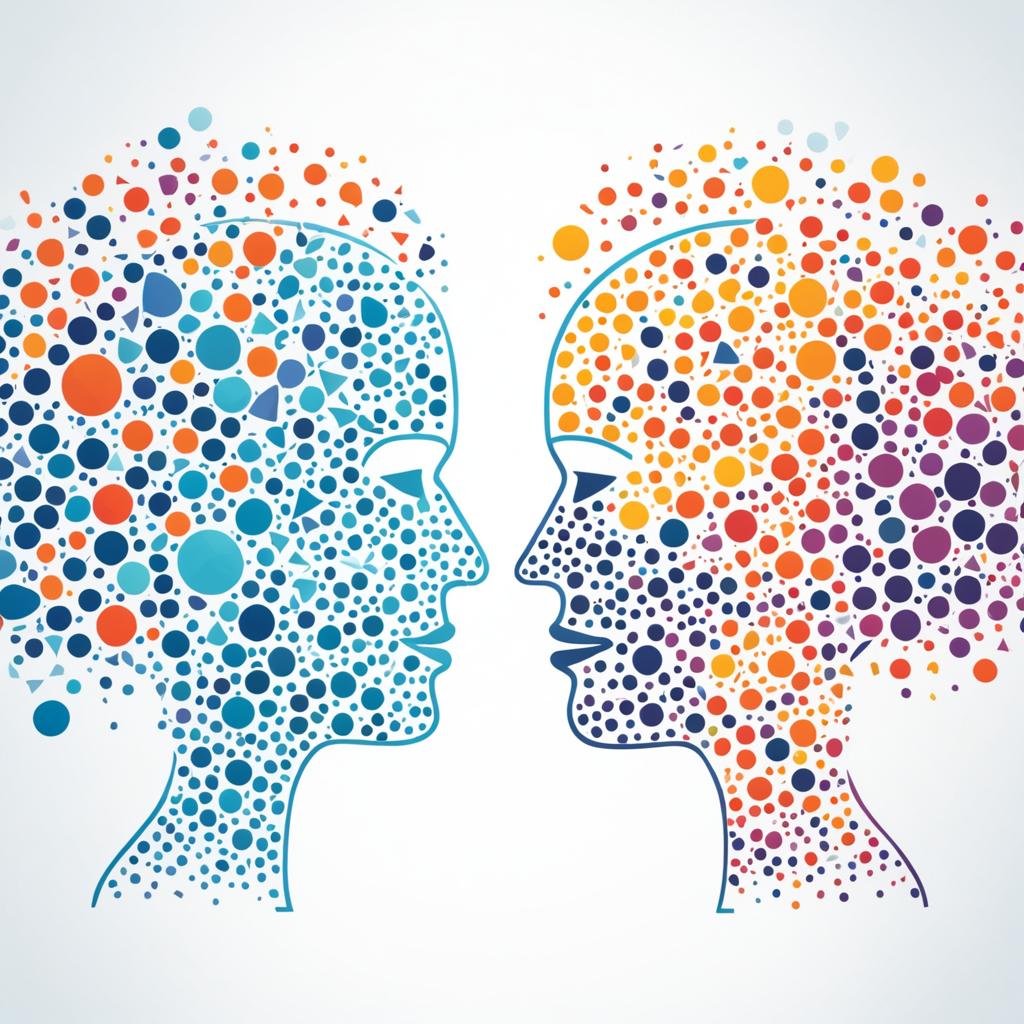In the field of psychology, gender plays a significant role in shaping behavior and mental processes. It impacts every aspect of our lives, from our identity development to the dynamics of our relationships. But did you know that gender diversity is more prevalent than you might imagine?
According to a study by the American Psychological Association, gender is not limited to a binary concept of male and female. In fact, there is a wide spectrum of gender identities that individuals identify with, including non-binary, genderqueer, and genderfluid, just to name a few. This diversity challenges traditional notions of gender and prompts us to explore the complexities of gender and its impact on our psychological experiences.
In this article, we will delve into the intricate dynamics of gender and its influence on psychological processes. We will explore how gender shapes behavior and mental processes, as well as the importance of diversity in understanding these dynamics.
Defining Gender in Psychology
Gender plays a significant role in psychology, shaping behavior, cognition, and social interactions. To understand the intricate dynamics of gender in this field, it is crucial to establish a clear definition of gender.
In psychology, gender refers to the socially constructed roles, behaviors, and expectations associated with being male or female. It encompasses the psychological and socio-cultural aspects of sex, extending beyond biological differences. The understanding of gender is influenced by psychological theories and empirical research, which contribute to our comprehension of human behavior.
Psychologists explore the multifaceted nature of gender by examining how it influences various psychological processes, including self-concept, identity development, and socialization. The concept of gender is not limited to binary categories but rather encompasses a broad spectrum of identities, including non-binary and gender non-conforming individuals.


Within the realms of psychology, gender is a concept that goes beyond biological sex, recognizing the complex interplay between biology, psychology, and society. By understanding this definition of gender, researchers and practitioners in psychology can gain valuable insights into the effects of gender on human behavior and contribute to creating a more inclusive and understanding society.
The Influence of Gender on Development
Gender plays a significant role in shaping the developmental process from infancy through adulthood. It encompasses the complex interplay between societal norms, biological factors, and socialization processes, resulting in the formation of gender identity and influencing psychological development.
From a young age, children receive societal cues and expectations regarding appropriate behaviors, interests, and roles based on their gender. This socialization process contributes to the construction of gender identity and influences how individuals perceive themselves and interact with others.
Biological factors also contribute to the development of gender identity. Genetic and hormonal influences shape physical characteristics and influence brain development, potentially impacting psychological traits and behaviors associated with gender.
The societal and cultural context in which individuals are raised further influences their understanding and expression of gender. Cultural norms and values dictate certain gender roles, attitudes, and expectations, which individuals integrate into their own sense of identity.
It is important to note that the developmental impact of gender is not limited to childhood and adolescence. Gender continues to affect individuals’ experiences and interactions throughout adulthood, shaping career choices, relationships, and overall psychological well-being.
Biological Factors and Gender Development
Biological factors, such as hormones and genetics, contribute to the development of gender identity. Prenatal hormone exposure influences brain organization and potentially influences the development of gender-typical behaviors and traits.
For example, prenatal testosterone exposure is associated with masculinization of the brain and an increased likelihood of engaging in stereotypically male behaviors. Conversely, lower levels of prenatal testosterone are associated with feminization of the brain and a higher likelihood of engaging in stereotypically female behaviors.
Genetic factors also play a role in gender development. Studies have identified specific genes that may be associated with gender identity formation, although the exact mechanisms behind these genetic influences are still being explored.
Societal Norms and Socialization Processes
Societal norms and socialization processes heavily influence the development of gender identity and behaviors. Children learn about gender through observation, imitation, and reinforcement of gender-specific behaviors by significant others, such as parents, teachers, and peers.
These socialization processes transmit cultural expectations of gender roles, contributing to the formation of gender identity. In some cultures, gender roles may be more rigidly defined, while in others, they may be more fluid and open to interpretation.
“Gender socialization begins at birth and continues throughout life, influencing our attitudes, behaviors, and beliefs about what it means to be male or female.” – Gender and Society
These socialization processes can perpetuate gender stereotypes and reinforce certain gender-related behaviors, interests, and expectations. For example, boys may be encouraged to pursue careers in STEM fields, while girls may be encouraged to focus on nurturing and caregiving roles.
Challenging these societal norms and promoting gender equality is essential for fostering the healthy development and well-being of individuals across the gender spectrum.


Overall, the influence of gender on development is multifaceted and encompasses a combination of societal, biological, and socialization factors. By understanding and addressing these influences, we can promote a more inclusive and equitable society that supports the diverse psychological development of individuals.
Gender Stereotypes and their Impact
Gender stereotypes have a significant influence on behavior and cognitive processes, shaping how individuals perceive themselves and make decisions. These deeply ingrained beliefs about gender roles often lead to biases and unjust expectations.
For example, society often expects men to be strong, logical, and assertive, while women are expected to be nurturing, emotional, and passive. These stereotypes can limit individuals’ self-perception and create barriers for personal and professional growth. However, it is important to remember that not all individuals conform to these stereotypes, and there is a wide diversity of personalities and strengths within each gender.
The impact of gender stereotypes can be seen in various domains of life. In the workplace, for instance, women may face challenges in leadership positions due to the perception that they are less competent or assertive than men. Men, on the other hand, may feel pressured to suppress their emotions or interests that are deemed traditionally feminine.


“Gender stereotypes have a disempowering effect on individuals, limiting their potential and reinforcing societal inequalities. It is crucial to challenge these stereotypes and promote a more inclusive and equitable society.”
Furthermore, the impact of gender stereotypes extends to decision-making processes. Studies have shown that both men and women can be influenced by gender stereotypes, leading to biased judgments and choices. For instance, when faced with a hiring decision, individuals may unknowingly favor candidates who fit the stereotypical attributes associated with a particular gender, rather than objectively assessing qualifications.
Gender stereotypes also have a profound impact on individuals’ psychological well-being. The pressure to conform to societal expectations can result in feelings of inadequacy, self-doubt, and internal conflict. It can lead to the suppression of authentic emotions and create mental health challenges, such as anxiety and depression.
Addressing gender stereotypes and their impact requires a multifaceted approach. Education plays a crucial role in challenging these stereotypes by promoting awareness, empathy, and critical thinking. It is essential to create inclusive environments that celebrate diversity and provide equal opportunities for individuals of all genders.
Key Takeaways:
- Gender stereotypes shape behavior and cognitive processes.
- Stereotypes can limit self-perception and create barriers for personal and professional growth.
- Gender stereotypes impact decision-making processes and can lead to biased judgments.
- Stereotypes have a significant impact on individuals’ psychological well-being and can contribute to mental health challenges.
- Challenging gender stereotypes requires education, awareness, and creating inclusive environments.
Gender Differences in Cognitive Abilities
Gender, an integral aspect of human identity, extends its influence beyond social and cultural dimensions into the realm of psychology. Research has identified noteworthy cognitive differences between genders, shedding light on the complexities of human cognition and mental processing.
It is important to note that these differences do not imply superiority or inferiority of one gender over another, as cognitive abilities encompass a broad range of skills and aptitudes that individuals develop through various factors. The variability observed in cognitive abilities among genders is a subject of ongoing scientific investigation.
Biological and social factors contribute to the observed disparities in cognitive abilities between genders. Biological differences, such as hormonal variations and brain structure, may influence cognitive functioning. For example, men tend to possess a higher average spatial ability, a cognitive skill often associated with navigation and visual-spatial reasoning. On the other hand, women demonstrate stronger verbal communication and language skills, showing a higher aptitude for verbal fluency and linguistic processing. These differences, however, do not indicate a fixed pattern for all individuals.
“The variations in cognitive abilities between genders highlight the remarkable diversity of human cognition, challenging the notion of rigid gender roles and affirming the importance of acknowledging individual differences.” – Dr. Sarah Johnson, Cognitive Psychologist
Additionally, socialization processes play a significant role in shaping cognitive abilities. Societal norms and expectations may influence the types of cognitive skills individuals are encouraged to develop from an early age. For instance, boys are often pushed towards activities that enhance spatial and mathematical skills, while girls may be directed towards language and nurturing-related endeavors. These socialization processes can impact the developmental trajectories of cognitive abilities.
It is crucial to approach the topic of gender differences in cognitive abilities with caution, emphasizing that these differences exist on a statistical level and do not dictate the abilities or potential of individuals. Recognizing and embracing the diversity of cognitive strengths within and across genders is essential for fostering inclusivity.


Debates and Future Research
The study of gender differences in cognitive abilities remains a complex and multifaceted area of research. While substantial evidence supports the presence of certain disparities, ongoing debates focus on the extent to which biological and social factors contribute to these differences.
Some researchers argue that the observed disparities are primarily a result of biological factors, asserting that inherent differences in brain structure and hormonal correlates contribute to distinct cognitive profiles among genders. Others emphasize the influence of socialization and cultural expectations, suggesting that societal factors play a more substantial role in shaping cognitive skill development.
Future research endeavors aim to unravel the intricate interplay between biology and socialization in determining gender differences in cognitive abilities. By employing advanced neuroscience techniques, examining cross-cultural samples, and considering contextual factors, researchers continue to deepen our understanding of these complex phenomena.
“The exploration of gender differences in cognitive abilities is an ongoing journey characterized by a delicate balance between embracing diversity and dispelling stereotypes, paving the way for a more nuanced understanding of human cognition.” – Dr. David Chen, Cognitive Scientist
Cultural and Cross-Cultural Perspectives on Gender
When it comes to gender, cultural perspectives play a crucial role in understanding its complexities. Gender roles and expectations vary across cultures, highlighting the importance of considering cultural influences in the field of psychology. Cultural norms shape not only gender identity but also behavioral patterns associated with gender.
In studying gender from a cross-cultural perspective, researchers face unique challenges. They must navigate the diverse beliefs, values, and practices surrounding gender in different societies. Cross-cultural research allows us to explore the similarities and differences in the ways various cultures approach and understand gender.


“Culture is the collective programming of the mind that distinguishes the members of one group or category of people from another.” – Geert Hofstede
Understanding cultural perspectives on gender not only broadens our knowledge but also challenges our assumptions and biases. By examining how different cultures construct and interpret gender, we gain a more comprehensive understanding of the intricate relationship between gender and psychology.
Gender and Cultural Identity
Cultural perspectives on gender influence individual and collective identities. Gender identities are shaped by cultural norms, which define what it means to be masculine, feminine, or non-binary within a specific cultural context. These identities are deeply intertwined with cultural values and beliefs.
- Some cultures have strict gender roles where males and females are expected to fulfill specific social roles and behaviors.
- In other cultures, gender roles may be more fluid, allowing individuals to express their gender identity in diverse ways.
- Non-binary genders and multiple gender categories are recognized in certain cultures, challenging the binary understanding of gender.
Exploring cultural perspectives on gender helps us recognize that gender is not a universal construct but rather a social and cultural phenomenon.
The Impact of Culture on Gender Expectations
Cultural norms shape the expectations placed on individuals based on their gender. These expectations can influence various aspects of life, including education, career choices, family roles, and social interactions. Cultural norms also play a significant role in socializing individuals into appropriate gender behaviors and can perpetuate gender stereotypes.
“Culture provides guidelines that individuals use to navigate social life, and these guidelines are inherently gendered.” – Kira Hall
By analyzing gender expectations across cultures, psychologists gain insights into the broader social context that shapes individual behavior and psychological well-being.
Understanding how cultural perspectives on gender influence psychology provides a more nuanced understanding of human behavior and the diverse ways in which individuals navigate their gender identities. It promotes cultural sensitivity and allows for the development of more inclusive and effective psychological interventions.
Gender and Mental Health
In the field of psychology, gender plays a significant role in the prevalence, presentation, and treatment of mental health disorders. Understanding how gender influences mental health outcomes is crucial for providing effective support and interventions. It is essential to examine the impact of gender on mental health stigma and access to mental healthcare to ensure equitable treatment for all individuals.
Research has shown that gender can influence the types of mental health disorders individuals may experience. For example, studies have found that women are more likely to be diagnosed with depression and anxiety disorders, while men are more prone to substance abuse and externalizing disorders such as conduct disorder. These differences may be influenced by biological, psychological, and social factors.
Moreover, societal expectations and gender roles can contribute to gender disparities in mental health. Traditional gender norms often discourage men from seeking help and expressing emotions, leading to underdiagnosis and undertreatment of mental health issues. On the other hand, women may face greater pressure and expectations related to maintaining relationships and caregiving responsibilities, which can increase their vulnerability to certain mental health challenges.
Gender influences mental health outcomes by shaping individuals’ experiences, perceptions, and coping mechanisms. Understanding these dynamics is crucial for developing targeted and effective interventions.
Mental health stigma also varies based on gender, with different expectations and stereotypes attached to men and women seeking help. Men may face social pressure to appear strong and self-reliant, which can discourage them from seeking appropriate mental health support. Women, on the other hand, may encounter judgments and stereotypes related to emotional instability or being “overly emotional” when discussing their mental health concerns.
Access to mental healthcare is another aspect where gender plays a critical role. Gender biases can affect the availability and affordability of mental health services. Women, for instance, may face inadequate access to mental healthcare due to financial constraints or caregiving responsibilities. On the other hand, men may face barriers due to the lack of mental health services specifically tailored to their needs or societal perceptions that mental health is a less pressing concern for them.
Gender Identity and Sexuality
Gender identity and sexuality are fundamental aspects of human psychology that play a significant role in shaping individuals’ sense of self. Understanding the complexities of gender identity development is crucial for gaining insight into how it intersects with one’s understanding of their own sexual orientation.
Gender identity refers to an individual’s deeply-held sense of being male, female, or something outside of the traditional binary categories. It is a deeply personal and subjective experience, often influenced by a combination of genetic, hormonal, and environmental factors. While many people’s gender identity aligns with the sex they were assigned at birth, others may identify as transgender or non-binary.
Sexuality, on the other hand, refers to an individual’s emotional, romantic, and sexual attractions toward others. It is an essential aspect of personal identity and can vary across a broad spectrum. Sexual orientation can encompass heterosexuality, homosexuality, bisexuality, pansexuality, asexuality, and other diverse experiences.
Understanding and accepting one’s gender identity and sexual orientation can be a deeply personal and individual journey. It is crucial for society to create inclusive and supportive environments that allow individuals to explore and embrace their authentic selves.
It is important to note that gender identity and sexual orientation are distinct but interconnected aspects of human psychology. While one’s gender identity may influence their exploration and understanding of their own sexual orientation, they are not synonymous. Every individual’s experience of gender identity and sexuality is diverse and should be respected and celebrated.
The Impact of Society and Culture
Society and culture significantly influence how gender identity and sexuality are perceived and understood. Societal norms, values, and beliefs about gender roles and sexual orientation shape individuals’ experiences and can impact their self-acceptance and overall well-being.
Cultural diversity plays a crucial role in shaping how gender identity and sexuality are expressed and accepted. Different cultures have their own unique perspectives and beliefs surrounding gender and sexuality, with some societies embracing a more fluid understanding of these concepts.
- The understanding and acceptance of various genders and sexual orientations can vary across cultures.
- Societal attitudes and expectations can have a profound impact on the well-being of individuals who identify outside of traditional gender norms or sexual orientations.
- Stigma, discrimination, and social pressures can create significant challenges for individuals exploring and embracing their gender identity and sexuality.
It is important for psychology professionals and society at large to challenge existing stereotypes, prejudices, and discrimination related to gender identity and sexuality. By promoting inclusivity, education, and acceptance, we can create a more equitable and supportive environment for all individuals, regardless of their gender identity or sexual orientation.
The Role of Gender in Relationships
Gender plays a significant role in shaping the dynamics of relationships. From communication styles to power dynamics, gender influences how individuals interact and navigate romantic, familial, and professional relationships. Understanding the impact of gender in relationships is crucial for fostering healthy and fulfilling connections.
When it comes to communication styles, gender can influence how individuals express their thoughts, emotions, and needs. Men and women often have different communication preferences and patterns. While women tend to prioritize emotional expression and seek connection through conversation, men may emphasize problem-solving and direct communication.
Power dynamics within relationships can also be influenced by gender. Societal norms and expectations often shape the distribution of power and decision-making between partners. These dynamics can impact the level of autonomy, influence, and control each individual experiences within the relationship.
Additionally, gender can contribute to common relationship challenges. For example, traditional gender roles may lead to stereotypes about gender-specific roles and responsibilities, which can create tension and conflicts. Addressing these challenges requires open communication, empathy, and an understanding of how gender norms can impact relationship dynamics.
“Gender influences the way we communicate, negotiate power, and face challenges within relationships. By recognizing and navigating these dynamics, we can cultivate healthier and more equitable connections.”
It’s important to note that gender’s influence on relationships is not limited to romantic partnerships. Gender dynamics also extend to familial relationships, where societal expectations regarding gender roles and responsibilities can influence family dynamics and how individuals relate to one another.
Furthermore, in professional settings, gender can impact workplace relationships, team dynamics, and opportunities for career advancement. Gender biases and stereotypes may affect how individuals are perceived, valued, and treated in the workplace.
Awareness of the role of gender in relationships allows for a more nuanced understanding of the challenges and opportunities that arise. By recognizing and appreciating the impact of gender, individuals and society can work towards fostering healthier, more egalitarian relationships that accommodate diverse needs and perspectives.
Intersectionality: Gender and Other Identities
Gender is not an isolated aspect of identity but intersects with various other identities, such as race, ethnicity, social class, and more. Understanding the concept of intersectionality is crucial in comprehending the role of gender in psychology within the context of diverse identities.
Intersectionality acknowledges that multiple aspects of an individual’s identity interact and influence their experiences and opportunities. It recognizes that experiences related to gender cannot be understood in isolation but are intertwined with other dimensions of identity. By considering the intersections of gender with other identities, we can gain a deeper and more nuanced understanding of how individuals navigate the world.
Intersectionality is particularly relevant in the study of gender and psychology, as it highlights the interplay between gender and various social systems of power and privilege. This framework recognizes that different identities, such as race, ethnicity, and social class, intersect with gender to shape an individual’s experiences, perspectives, and opportunities in unique ways.
For example, intersectionality allows us to explore how gender intersects with race in the experiences of women of color. It helps us understand the unique challenges and opportunities faced by individuals who navigate multiple marginalized identities simultaneously.
Intersectionality is not just about adding identities together; it’s about recognizing the distinct experiences that emerge at the intersections. It is a call to consider the complexity and diversity within human experiences and to challenge systems of oppression that perpetuate inequalities.
An intersectional approach to studying gender in psychology promotes inclusivity and recognizes the importance of diverse perspectives. By exploring how gender interacts with other identities, researchers can gain insights into the complex ways individuals experience and understand their gender in different social contexts.
Challenging Gender Stereotypes through Intersectionality
One way intersectionality enhances our understanding of gender in psychology is by challenging and deconstructing traditional gender stereotypes. Stereotypes about gender often fail to account for the lived experiences of individuals who belong to multiple identity groups.
By considering the interactions between gender and other identities, we can challenge limiting assumptions and promote a more diverse and accurate understanding of gender. Intersectionality encourages us to recognize and value the experiences and voices of individuals who are often marginalized or overlooked.
Conclusion
In conclusion, understanding the role of gender in psychology is crucial for gaining insight into human behavior and mental processes. Gender shapes our perceptions, actions, and interactions, impacting every aspect of our lives.
By recognizing and acknowledging the influence of gender, we can foster a more inclusive and accurate understanding of human psychology. Embracing diversity and challenging societal norms are essential steps towards creating a more equitable and inclusive society.
It is vital to continue conducting research and promoting dialogue on the intricate relationship between gender and psychology. By exploring these dimensions, we can better address the unique needs and experiences of individuals with different gender identities.
As the field of psychology evolves, it is important to consider the intersectionality of various identities, including race, ethnicity, social class, and more. By embracing a comprehensive understanding of gender within the context of diverse identities, we can gain deeper insights into the complexities of human psychology.
